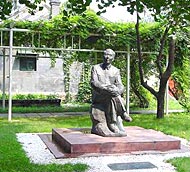
Eighteen Qianhai Xijie Street, a deep courtyard located near Beijing's Shicha Lake, is the former residence of Guo Moruo, an outstanding Chinese writer, poet, dramatist, historian, archaeologist and paleographer.
The writer was born into a landlord's family in Leshan County, Sichuan Province, in 1892, as Guo Kaizhen. As a boy, he had access to a wide selection of literary works that sparked his lifelong interest in poetry and language. He went to Japan in 1914, first to study medicine and then literature. In 1918, he began to write a new style of poetry under the pen name Guo Moruo, a name he took from the Mo and Ruo rivers of his beloved hometown.
In 1921, Guo returned to China and published his poetry collection The Goddesses, laying a foundation for Chinese new-style poetry, which won immediate popularity. He again went to Japan in 1928. During his stay there, he devoted himself to the study of Chinese history and characters. He returned to his homeland in 1937 and wrote many works in succession, including the historical plays Qu Yuan and Commander's Tiger-Shaped Tally and a history book, The Bronze Age.
Following the founding of the People's Republic of China in 1949, he held a number of high-level government posts. He was, among other things, vice-premier of the Government Administration Council, vice chairman of the Standing Committee of the National People's Congress and Chinese People's Political Consultative Conference, chairman of the China Federation of Literature and Art Circles, president of the Chinese Academy of Sciences. While he handled government affairs, he continued with his literary ambitions, penning the historical plays Cai Wenji and Empress Wu Zetian, the poetry collections Ode to New China, Easterly Wind, and Tides, and the academic work Li Bai and Du Fu.
On June 12, 1978, the heart of the man who had made great contributions to Chinese science, culture and politics stopped beating.
The courtyard where Guo had lived for 15 years, from November 1963 until his death, was formerly a prince's garden during the Qing Dynasty (1644-1911). It was listed as an important cultural relic under state protection in 1982, on Guo's 90th birthday, and officially opened to tourists in 1988.
It was in this small courtyard that Guo wrote his theses, monographs, poems and other works. Many manuscripts, books and documents are still kept there.
Guo loved nature. The flowers and plants Guo and his wife planted continue to flourish.
On the lawn in north end of the courtyard stands a gingko tree, which Guo called "the national tree of China" and "a living monument to Chinese culture." There is a short story behind this tree. In 1954, Yu Liqun, Guo's wife, left Beijing for medical treatment. Missing her very much, Guo brought a tree seedling from a forestry center and planted it in his courtyard at 5 Dayuan Lane in Xicheng District. He named it the Mother Tree. Guo taught his children to water and trim it and asked them to pray for the early recovery of their mother. When the family moved in 1963, they also moved the tree to the new courtyard. The Mother Tree is flourishing to this day and is heavy with fruit every autumn.
On the lawn is a bronze statue of Guo, a work by Situ Zhaoguang, a well-known sculptor and professor at the Central Academy of Fine Arts, on the 10th anniversary of Guo's death. The shining statue of Guo gazes forever at the Mother Tree.
Address: No.18 Qianhai Xijie Street;
Opening hours: 9:00 AM-4:30 PM (Tuesday - Sunday);
Entry ticket: 8 yuan for grown-ups, 4 yuan for students;
Traffic: Bus No.s 13, 42, 107, 111, 118, 701, 810, 823 and 850; get off at Back Door of the Beihai Park.
(China Pictorial)












